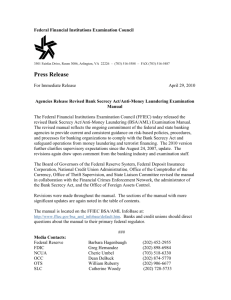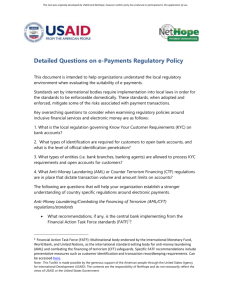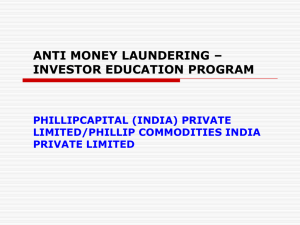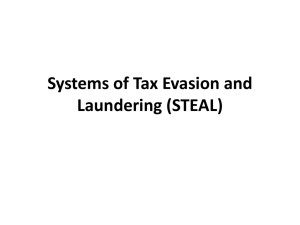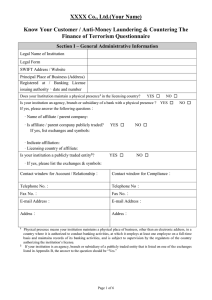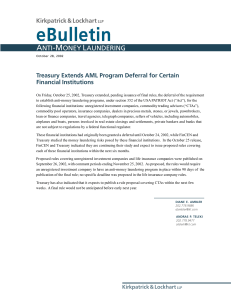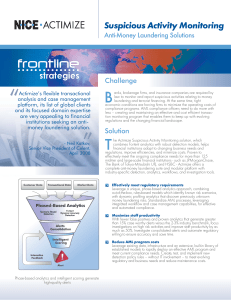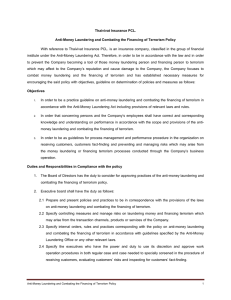Audrey E. Anderson Bank of Jamaica / The Federal Reserve System
advertisement
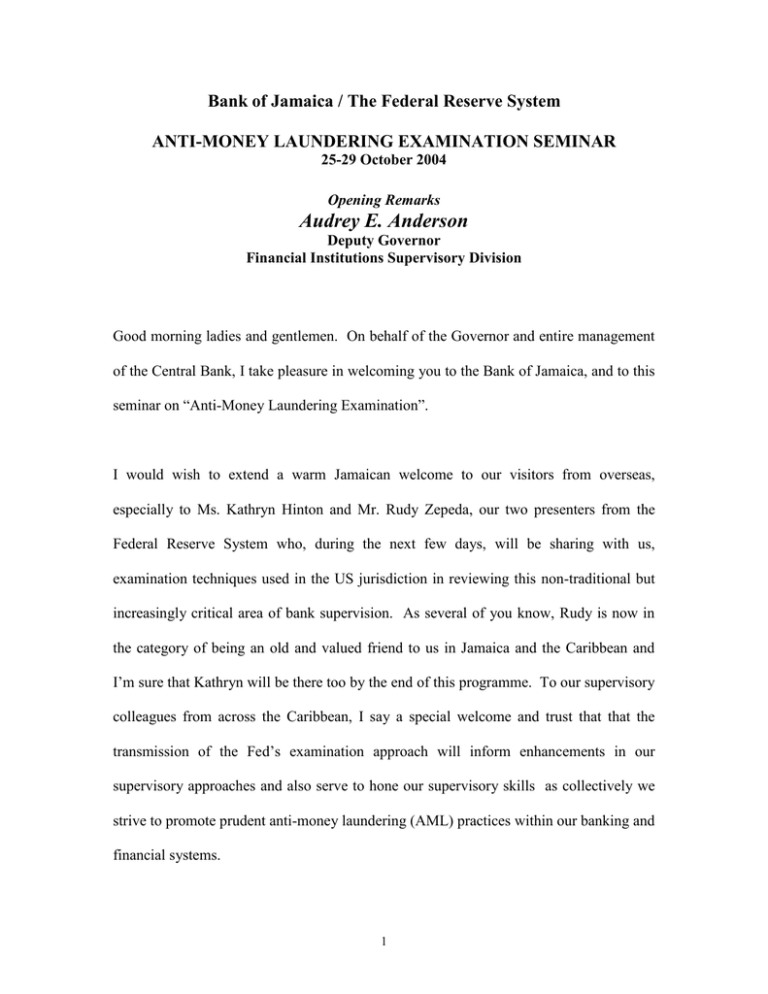
Bank of Jamaica / The Federal Reserve System ANTI-MONEY LAUNDERING EXAMINATION SEMINAR 25-29 October 2004 Opening Remarks Audrey E. Anderson Deputy Governor Financial Institutions Supervisory Division Good morning ladies and gentlemen. On behalf of the Governor and entire management of the Central Bank, I take pleasure in welcoming you to the Bank of Jamaica, and to this seminar on “Anti-Money Laundering Examination”. I would wish to extend a warm Jamaican welcome to our visitors from overseas, especially to Ms. Kathryn Hinton and Mr. Rudy Zepeda, our two presenters from the Federal Reserve System who, during the next few days, will be sharing with us, examination techniques used in the US jurisdiction in reviewing this non-traditional but increasingly critical area of bank supervision. As several of you know, Rudy is now in the category of being an old and valued friend to us in Jamaica and the Caribbean and I’m sure that Kathryn will be there too by the end of this programme. To our supervisory colleagues from across the Caribbean, I say a special welcome and trust that that the transmission of the Fed’s examination approach will inform enhancements in our supervisory approaches and also serve to hone our supervisory skills as collectively we strive to promote prudent anti-money laundering (AML) practices within our banking and financial systems. 1 The Bank of Jamaica and indeed the entire Caribbean Group, takes very seriously the threats posed by money laundering to our financial systems. This reputed billion dollar illegal activity has the power not only to undermine the integrity of financial entities, but also to corrupt legitimate industries, threaten the political stability of states and societies and damage the reputation of companies and indeed entire nation. Given our unique relationship with financial institutions, we, as supervisors, have a critical role to play in mitigating the risks of money laundering to our countries. Our financial institutions are potential vehicles for the cleansing of ill-gotten gains, and it is important that we not only promote the development and application of sound AML measures in our banking systems, but also review the effectiveness of such measures and require implementation of more vigorous systems where necessary. It therefore means that our supervisory or regulatory agencies must have a cadre of professionals sufficiently skilled in AML examinations in order to identify frailties in bank’s internal and operating systems that may expose them to undue risk of money laundering. I must interject here, that although this seminar’s critical focus is ‘Anti-Money Laundering Examinations’, the related threat of terrorism financing cannot be ignored, especially in the context of 9/11. Financial institutions worldwide are potential funnels for terrorism funding and as such the construct of any comprehensive examination framework and practice must seek to simultaneously tackle the dual threats posed by both 2 types of activities… and I note from the Agenda that a session has been quite appropriately devoted to this related topic. However, the best examination practices need to be supported within a robust and comprehensive legislative framework which goes beyond merely criminalizing the acts of money laundering and terrorism financing, to imposing responsibility on all potential conduits for money laundering and terrorist funding to adopting appropriate risk mitigating practices, and to establishing effective machinery for monitoring adherence to legal and prudential requirements. Very importantly, the legislative framework must empower supervisors to require effective AML measures of their constituents and further provide the supervisors with the necessary authority to apply sanctions for failure to adhere to sound AML practices. Fundamental in any structured and cohesive counter attack to these twin threats, is the ability for responsible authorities to share intelligence not only with other national agencies inclusive of law enforcement authorities, but also with external supervisory and regulatory authorities. An effective legislative framework therefore needs to provide Supervisors with adequate authority for information sharing under specific circumstances, and with agreed safeguards for the use and confidentiality of information so shared. 3 I am aware, that in the face of these challenges, intensive work has taken place across the Caribbean, and is continuing, to strengthen our legislative framework and implement effective anti-money laundering programmes consistent with international best practice. In fact, the inclusion of this programme in our schedule of 2004 regional training events is just one aspect of these initiatives on the part of the Caribbean Group of Banking Supervisors. I should also make the point that as a result of the massive effort and significant resources expended by our various governments in upgrading our laws and regulatory structures in this area, no Caribbean country now remains on the FATF so called ‘black list’ of Non-Cooperative Countries and Territories (NCCT). In fact, no member of the wider Caribbean Financial Action Task Force (CFATF) [which includes the Caribbean and Central America] now remain on that list. The last CFATF member to exit that list was Guatemala as of early 2004. As bank regulators we now have an important ‘follow up’ role to play in making our systems as non-user-friendly as possible to all those who would subvert them to cleanse their “dirty” money. Here at the Bank of Jamaica, in recognition of the role of supervisors in developing and implementing an effective counter attack to these twin threats, we have, since the late 1980s, issued ‘Anti-Money Laundering Guidance Notes’ to our supervised institutions which were again upgraded in 1999. This coincided with enhancements to our on-site review programme to test licensees’ compliance with existing laws, regulations, 4 regulatory guidelines and internationally recognized anti-money laundering standards and methodologies. Earlier this year, in mid 2004, the Bank of Jamaica issued to its supervised licensees a comprehensively upgraded Guidance Note and Best Practice Standard, incorporating the ‘Eight Special Recommendations’ on Terrorist Financing, and the newly revised ‘Forty Recommendations on Money Laundering’ issued by the Financial Action Task Force (FATF). The BOJ Standards also give recognition to the Best Practice Standards for Customer Due Diligence Procedures issued by the Basel Committee on Banking Supervision. Consequently, the Bank of Jamaica’s examination methodology has been upgraded to incorporate all the recent enhancements to international best practice and allows for an increased scope for the onsite review of the AML/CFT framework existing within the licensed financial institutions. There is also a special focus on AML reviews of entities like cambios and remittance companies which have now been brought within the Central Bank’s regulatory ambit. Consistent with the United Nations Security Council Resolution 1373, the Bank of Jamaica also actively participates in national efforts to ensure that Jamaican financial intermediaries are not being used as conduits for the funding of terrorists and terrorist groups. The Central Bank also chairs a Financial Crimes Legislative Task Force which has been charged with the responsibility of making proposals to Cabinet for needed amendment and/or enactment of legislation covering all facets of financial crime inclusive of money laundering, terrorism financing, and related issues. 5 As recently as two weeks ago, the Lower House of Parliament approved amendments to financial legislation, which will extend the information sharing capabilities of our Regulators. And we expect this type of legislative upgrading to be a continuous process across the region. In closing, it cannot be stressed too often, the importance of partnership among relevant authorities in resisting the threat of money laundering and terrorism financing to our financial systems. Let me once again express our thanks to the Board of Governors of the Federal Reserve System for being ever ready and willing to facilitate training in the Caribbean region. I am confident that this seminar will energize and better equip our participants to undertake the very material responsibilities that have been reposed in them. For all our overseas visitors, I do hope that you will find time to enjoy the cultural and culinary delights of our island before your return home to the demanding task of preserving the integrity of our financial systems. Thank you. 6
